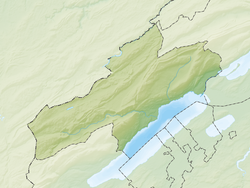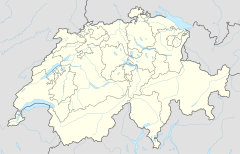Le Locle, Switzerland
| Le Locle | ||
|---|---|---|
 |
||
|
||
| Coordinates: 47°03′25″N 6°44′55″E / 47.0569°N 6.7486°ECoordinates: 47°03′25″N 6°44′55″E / 47.0569°N 6.7486°E | ||
| Country | Switzerland | |
| Canton | Neuchâtel | |
| District | Le Locle | |
| Government | ||
| • Executive |
Conseil communal with 5 members |
|
| • Mayor |
Président du Conseil communal (list) Denis de la Reussille (as of March 2014) |
|
| • Parliament |
Conseil général with 41 members |
|
| Area | ||
| • Total | 23.14 km2 (8.93 sq mi) | |
| Elevation | 945 m (3,100 ft) | |
| Population (Dec 2016) | ||
| • Total | 10,433 | |
| • Density | 450/km2 (1,200/sq mi) | |
| Postal code | 2400 | |
| SFOS number | 6436 | |
| Website |
www SFSO statistics |
|
| UNESCO World Heritage Site | |
|---|---|
| Official name | La Chaux-de-Fonds / Le Locle, watchmaking town planning |
| Location |
Canton of Neuchâtel, Le Locle District, Switzerland |
| Coordinates | 47°03′25″N 6°44′55″E / 47.0569°N 6.7486°E |
| Area | 23.14 km2 (249,100,000 sq ft) |
| Criteria | iv |
| Reference | 1302 |
| Inscription | 2009 (33rd Session) |
| Website | www |
|
[]
|
|
Le Locle is a municipality in Le Locle District in the Canton of Neuchâtel in Switzerland.
It is situated in the Jura Mountains, a few kilometers from the city of La Chaux-de-Fonds. It is the third smallest city in Switzerland (in Switzerland a place needs more than 10,000 inhabitants to be considered a city).
Le Locle is known as a center of Swiss watchmaking, even cited as the birthplace of the industry, with roots dating back to the 1600s. The municipality has been home to manufactures such as Mido, Zodiac, Tissot, Ulysse Nardin, Zenith, Montblanc, Certina as well as Universal Genève, before the latter company relocated to Geneva. The town's history in watchmaking is documented at one of the world's premier horological museums, the Musée d'Horlogerie du Locle, Monts Castle, located in a 19th-century country manor on a hill north of the city Restored historic underground mills (grainmill, oilmill, sawmill) can be seen in a cave located about one kilometer (0.6 miles) west of the city center.
The name of the town derives from the word for lake or trou d´eau.
Le Locle, as well as La Chaux-de-Fonds, owes its survival to the manufacturing and exports of watches. The industry of watch making was brought to Le Locle in the 17th century by Daniel JeanRichard, a self-taught watchmaker who encouraged the farmers of the area to start manufacturing watch components for him during the long winters. In the 20th century, the micro-mechanical industry was added.
...
Wikipedia





